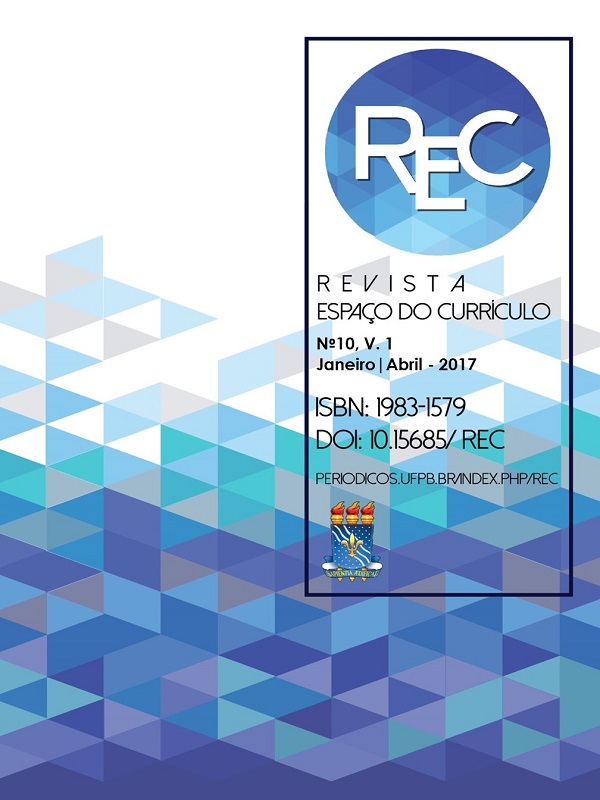THE PROFILE OF CONTEMPORARY SCHOOL MANAGER
from incorporations to incorporations to exercise the function
DOI:
https://doi.org/10.15687/rec.v10i1.33386Keywords:
School management, The teacher training, The teaching practiceAbstract
This paper aims to address some theoretical issues and their practical issues in relation to the activities of the school manager, taking as a cut the general context of public institutions of Basic Education. It also seeks to understand and discuss the unfolding of the actions and the manager's relations, through his delayed training. Therefore, it proposes an outline of the profile of the school manager with an association between his training and the models of management that already exist, his correspondences to establish a characterization of the contemporary manager, susceptible to all the actions already existing in past practices. Understanding as school management the responsibility for stimulating quality teaching, offering a broad view of the school's development and, consequently, boosting its development as a whole. Being the manager, characterized by dedication and commitment to areas of expertise ranging from pedagogical management to the management of school results, moving through items such as administrative capacity, financial management and even personal relationships between employees, parents and students. It concludes by reflecting on the current school model that demands a marked professional development from the manager of multiple functions and challenges. An unfinished and complex profile, characterized by a lack of financial incentive and professional devaluation of the function.
Downloads
Metrics
References
ANDRADE, Maria Margarida de. Introdução à metodologia do trabalho científico: elaboração de trabalhos na graduação. 4. ed. São Paulo: Atlas, 1999.
BAHIA, Lei nº 8.261, de 29 de maio de 2002, DOE datado em 30/05/2002.
CASTRO, Alda Maria Duarte Araújo. Administração gerencial: a nova configuração da gestão da educação na América Latina. RBPAE – v.24, n.3, p. 389-406, set./dez. 2008
CASTRO, Alda Maria Duarte Araújo; ARAÚJO, Suêldes de. Gestão educativa gerencial: superação do modelo burocrático? Ensaio: aval. pol. públ. Educ., Rio de Janeiro, v. 19, n. 70, p. 81-106, jan./mar. 2011
DRUCKER, Peter Ferdinand. Sociedade pós-capitalista. São Paulo: Pioneira, 1993.
FREITAS, Katia Siqueira de. Uma Inter-relação: políticas públicas, gestão democrático-participativa na escola pública e formação da equipe escolar, Em Aberto, Brasília v. 17, n. 72, fev./jun. 2000.
LAKATOS, E. M.; MARCONI, M. de. A Metodologia do trabalho científico. 4. ed. São Paulo: Atlas, 1992. 214 p.
LIMA, João Alberto de Oliveira; CUNHA, Murilo Bastos da. Tratamento da Informação legislativa e Jurídica: Uma perspectiva histórica. Brasília: Senatus, v. 6, n.2, p 33 a 38, out, 2008.
LIMA, João Alberto de Oliveira; CUNHA, Murilo Bastos da. A escola como organização educativa: uma abordagem sociológica. São Paulo: Cortez, 2003.
LIMA, Manolita Correia. A Engenharia da Produção Acadêmica. São Paulo: Unidas, 1997.
LOURENÇO FILHO, M. B. Organização e administração escolar: curso básico. São Paulo: Edições Melhoramentos, 1963.
MOGAN, Gareth. Imagens da Organização. São Paulo: Atlas, 2010.
PARO, V. H. Administração escolar: introdução crítica. 2. ed. São Paulo: Cortez; Autores Associados, 1987.
SANDER, Benno. Administração da Educação no Brasil: genealogia do conhecimento. Brasília: Liber Livro, 2007.
SANTOS, Clóvis Roberto dos. A gestão educacional e escolar para a modernidade. São Paulo: Cengage Learning, 2008.
SÃO PAULO SP. Lei Complementar nº 836, de 30 de dezembro de 1997. Diário Oficial de São Paulo SP, em 31 de dezembro de 1997, p.1.
SILVA, Guilherme Rego da. Tendências Actuais na Formação em Administração Educacional. Rev. Port. de Educação v.20 n.1 Braga jan. 2007, p. 221-245.
TEIXEIRA, Maria Cecília Sanches; PORTO, Maria do Rosário Silveira. Gestão da Escola: novas perspectivas. São Paulo, apostila digitada, 1999.
UNICEF, PNUD, Inep-MEC (coordenadores). Indicadores da qualidade na educação / Ação Educativa,. – São Paulo: Ação Educativa, 2004. Disponível em < http://portal.mec.gov.br/seb/arquivos/pdf/Consescol/ce_indqua.pdf> Acesso em 16 de março de 2016.
WEBER, Max. Burocracia. In: GERTH, H. H.; MILLS, W. (Org.) Ensaios de Sociologia. Rio de Janeiro: Guanabara, 1982. p. 229-282.
Downloads
Published
How to Cite
Issue
Section
License
By submitting an article to Curriculum Space Journal (CSJ) and having it approved, the authors agree to assign, without remuneration, the following rights to Curriculum Space Journal: first publication rights and permission for CSJ to redistribute this article. article and its metadata to the indexing and reference services that its editors deem appropriate.
















